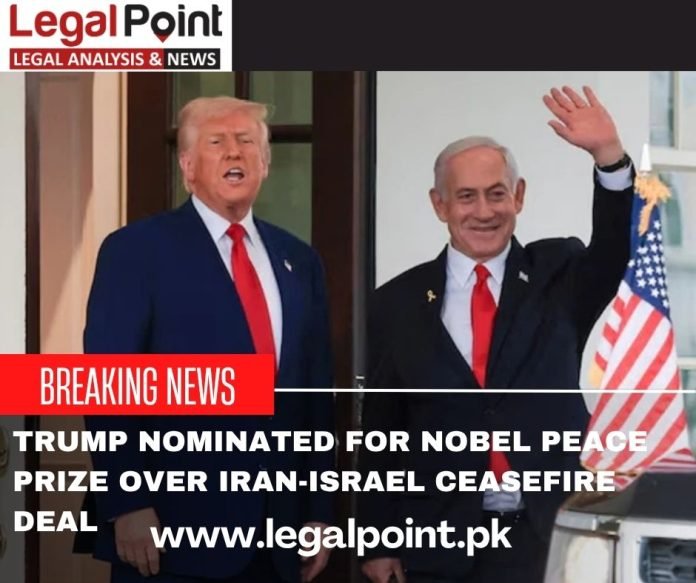In June 2025, the world witnessed intense tension between Iran and Israel, two nations with a long history of conflict. Amid growing fears of a full-scale war, former U.S.In order to mediate a truce, President Donald Trump took the initiative. Trump peace efforts in Iran-Israel conflict 2025 have since become a hot topic in international media, sparking discussions in political, diplomatic, and legal circles.
This article explores how Trump got involved, what actions he took, and why some believe he deserves the Nobel Peace Prize. It also explains the background, responses, and long-term implications of the ceasefire deal.
Background of the Conflict
The Iran-Israel conflict in 2025 began when Israeli forces launched airstrikes on suspected Iranian nuclear facilities. These strikes came after intelligence reports suggested Iran was close to developing nuclear weapons. In response, Iran fired missiles at Israeli military bases. The region quickly moved toward open war.
As the conflict escalated, thousands of civilians were displaced, oil prices surged, and global leaders grew concerned. The U.N. called for immediate de-escalation, but no party seemed ready to back down.
Trump’s Unexpected Entry
Although Donald Trump was not in office in 2025, he remained an influential political figure. When diplomacy failed to stop the growing violence, Trump peace efforts in Iran-Israel conflict 2025 began through behind-the-scenes talks. He used his personal connections in the Middle East, including leaders in the UAE and Saudi Arabia, to pressure both Iran and Israel to come to the table.
On June 21, U.S. military forces, with Trump’s strategic advice, launched limited strikes to halt Iran’s nuclear development. While controversial, these actions forced both sides to consider peace. The three-step ceasefire plan that Trump had then suggested was accepted by June 23.
The Ceasefire Agreement
The ceasefire was officially declared on June 25, 2025. Key elements included:
- Immediate halt to military actions on both sides.
- Monitoring of Iran’s nuclear activities by international agencies.
- Mediation efforts led by neutral states such as Oman and Switzerland.
This diplomatic success was largely credited to Trump peace efforts in Iran-Israel conflict 2025, including his direct communication with both Iranian officials and Israeli leadership.
Nobel Peace Prize Nomination
After the truce, U.S. Congressman Buddy Carter formally nominated Trump for the Nobel Peace Prize in a letter to the Norwegian Nobel Committee. The letter praised Trump for:
- Preventing Iran from acquiring nuclear weapons
- Stopping a dangerous regional war
- advancing Middle Eastern peace and stability
This nomination drew international attention and fueled further debate on Trump’s role as a peace negotiator.
Mixed Global Reactions
Trump’s nomination was met with both praise and criticism.
Supporters argue that:
- A major conflict in the Middle East was averted by his activities.
- He proved that even out of office, he could influence peace
- His “peace through strength” approach was effective
Critics, however, claim:
- The U.S. airstrikes could have violated international law
- Trump’s methods lacked transparency
- The peace may only be temporary
Despite the division, Trump peace efforts in Iran-Israel conflict 2025 remain one of the year’s most talked-about international events.
6 Most Asked Questions (FAQs)
Q1: Why did Iran and Israel go to war in 2025?
A: Tensions rose when Israel attacked Iran’s nuclear facilities, fearing weapon development. Iran responded with missile attacks, starting the conflict.
Q2: What role did Trump play in the ceasefire?
A: Trump used diplomatic backchannels and military advice to pressure both countries into agreeing to a ceasefire.
Q3: Who nominated Trump for the Nobel Peace Prize?
A: U.S. Congressman Buddy Carter nominated Trump, citing his efforts to prevent nuclear war and promote peace.
Q4: Was the ceasefire successful?
A: Yes, the ceasefire was declared on June 25, though it remains fragile and monitored by international agencies.
Q5: Is Trump’s nomination supported by the U.S. government?
A: The nomination was made independently by a Congressman. It’s not an official U.S. government endorsement.
Q6: What is the long-term impact of Trump’s efforts?
A: It may set a precedent for non-official leaders influencing global diplomacy and highlight alternative diplomatic channels.
Legal Point of View
From a legal perspective, the Trump-backed actions raise important questions:
- Was the U.S. justified in launching airstrikes? Under international law, any use of force must meet standards under the U.N. Charter. The legality of preemptive strikes depends on proving an imminent threat.
- Can a private citizen influence foreign peace agreements? While unusual, it is not illegal. However, official governments typically handle such matters.
- Does this affect U.S. foreign policy? While Trump’s efforts were independent, they indirectly influenced global perceptions of American diplomatic power.
At Reach Us Legal, we provide expert legal analysis on international conflicts, war law, foreign policy actions, and how these affect individuals and organizations. We also offer full tax and legal consultation services for professionals working in international zones or NGOs involved in peacekeeping.
Conclusion
Trump peace efforts in Iran-Israel conflict 2025 reflect how personal diplomacy and strategic intervention can impact world events. Trump’s impact in bringing an end to a terrible conflict has changed the discourse on unconventional diplomacy and presidential legacy, regardless of whether he receives the Nobel Peace Prize.
For expert legal advice on international law, diplomacy, or tax matters related to foreign missions, Reach Us Legal is here to support you every step of the way.
Follow Us on Social Media: Legal Point
Trump Peace Efforts in Iran-Israel Conflict 2025,Legal Point



